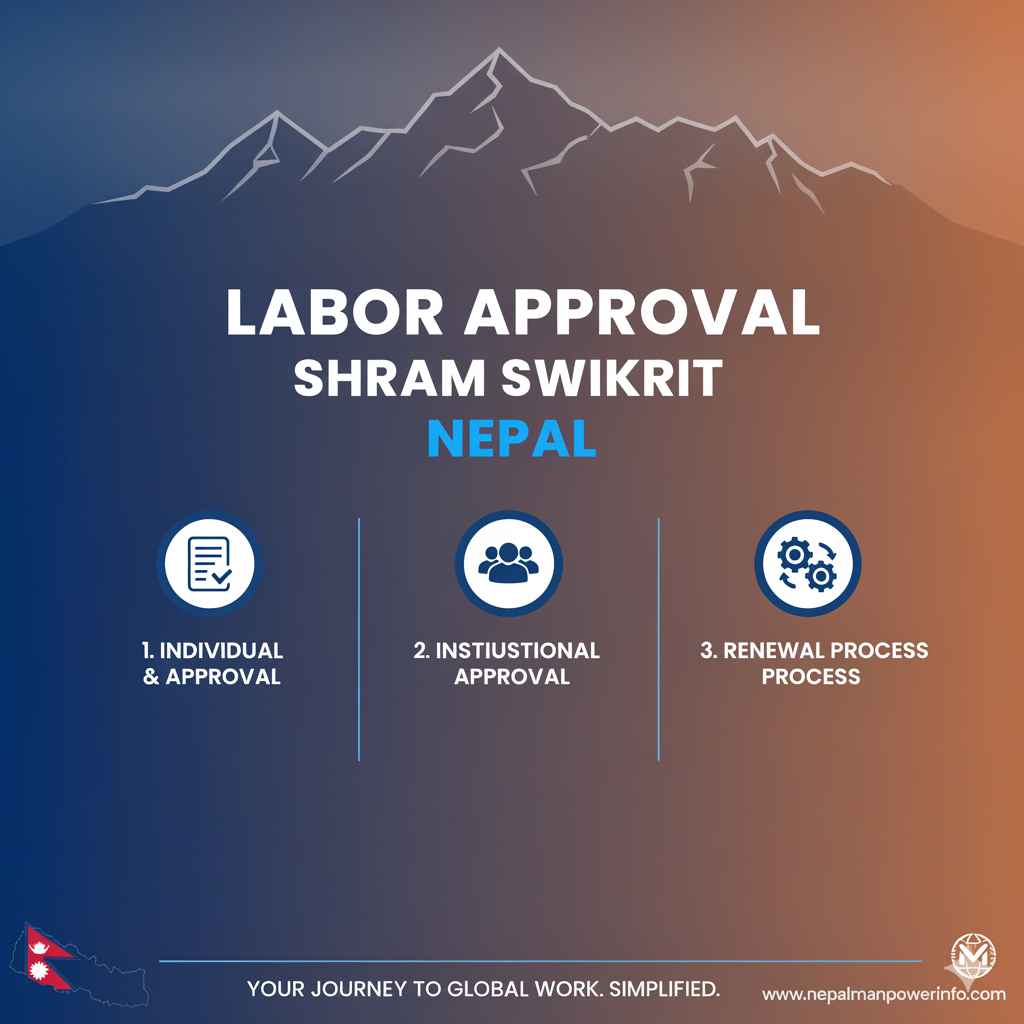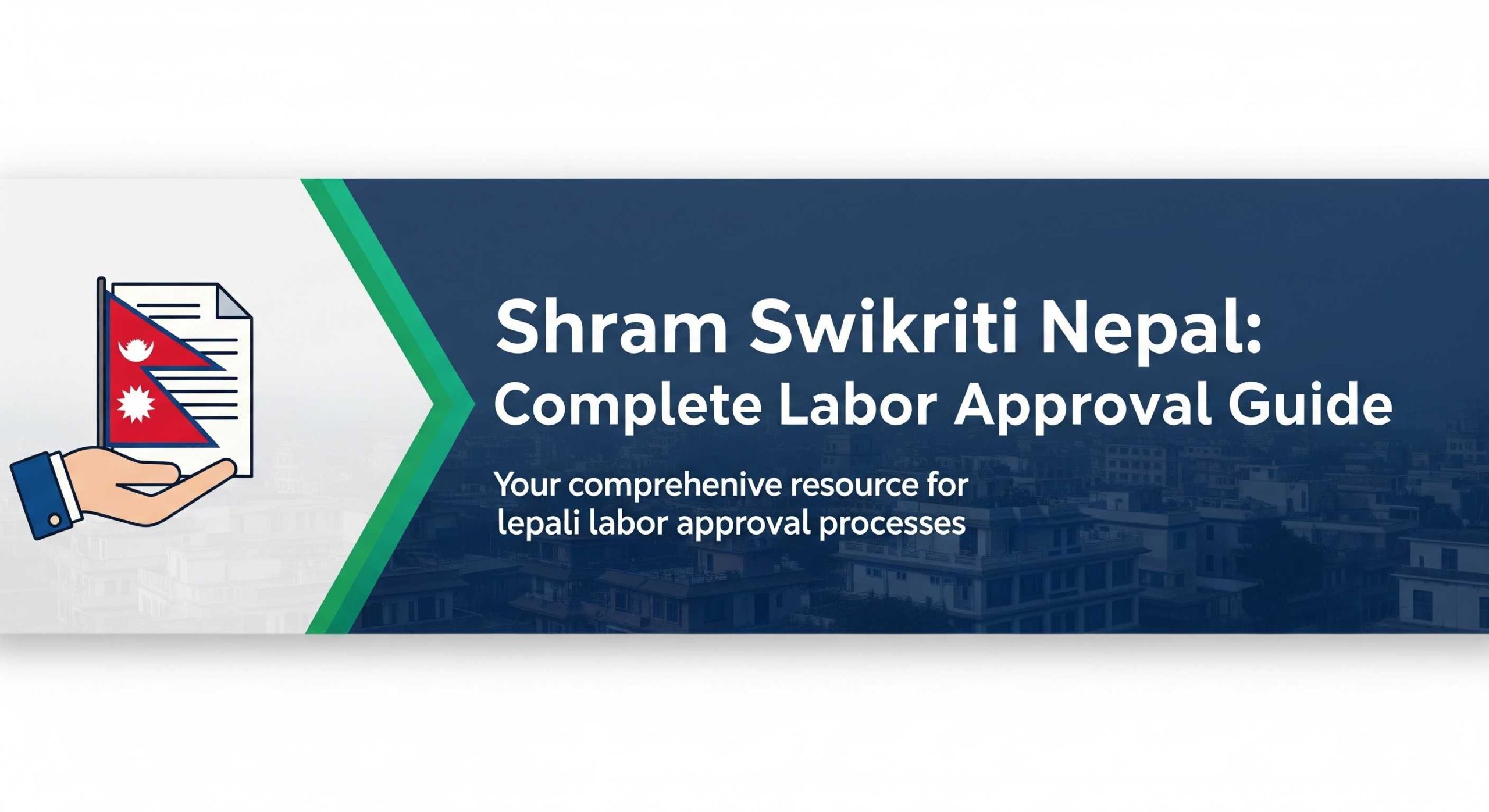Shram Swikriti (Labor Approval) in Nepal represents the official government authorization required for foreign employment of Nepali citizens and work permits for foreign nationals in Nepal. This comprehensive guide provides authoritative insights into Nepal’s labor approval system, combining legal expertise with practical guidance unavailable on official government websites.
Understanding Shram Swikriti: Legal Framework and Foundation
The Shram Swikriti system in Nepal operates under a robust legal framework primarily governed by two key legislations:
Legal Framework Governing Labor Approval Processes
The Labor Act, 2074 (2017) and Foreign Employment Act, 2042 (1985) form the cornerstone of Nepal’s labor approval system. Recent amendments have significantly modernized the process, making it more transparent while addressing emerging challenges in foreign employment.
Key provisions include:
- Section 22-23 of Labor Act 2074: Mandates work permits for foreign nationals
- Foreign Employment Act amendments: Removed the 100-worker annual requirement for manpower companies
- Digital transformation: Online application systems replacing paper-based processes
The Department of Foreign Employment (DoFE) and Department of Labor serve as the primary regulatory bodies, each with distinct responsibilities in the Shram Swikriti ecosystem.

Recent Amendments and Changes to Nepal’s Labor Laws
Nepal’s labor laws have undergone significant reforms to address contemporary challenges:
Major Amendments Impacting Labor Approval
- Foreign Employment Act Amendments (2024)
- Eliminated mandatory requirement for licensed manpower companies to send 100 workers abroad annually
- Enhanced transparency in worker selection processes
- Strengthened penalties for fraudulent practices
- Labor Act 2074 Implementation Updates
- Streamlined work permit applications for foreign nationals
- Enhanced worker protection provisions
- Digital integration of approval processes
These amendments reflect Nepal’s commitment to modernizing its Shram Swikriti system while protecting worker rights and promoting legitimate foreign employment opportunities.
Categories of Shram Swikriti Available in Nepal
Nepal offers several types of labor approvals to accommodate different employment scenarios:
Types of Labor Approvals
| Category | Duration | Purpose | Fee Range (NPR) |
|---|---|---|---|
| Regular Labor Approval | 1-2 years | Standard foreign employment contracts | 10,000 – 15,000 |
| Short-Term Labor Approval | Up to 6 months | Temporary projects, seasonal work | 5,000 – 8,000 |
| Institutional Labor Approval | Variable | Companies hiring multiple workers | 15,000 – 25,000 |
| Individual Labor Approval | 1 year | Personal foreign employment | 8,000 – 12,000 |
| Renewal Labor Approval | Extension | Extending existing approvals | 3,000 – 5,000 |
Each category serves specific employment needs and comes with distinct documentation requirements and processing timelines.
Documentation and Procedures for Obtaining Shram Swikriti
The Shram Swikriti application process requires meticulous preparation and documentation:
Essential Documentation Requirements
For Nepali Citizens Seeking Foreign Employment:
- Valid passport with minimum 6 months validity
- Employment contract from foreign employer
- Medical fitness certificate
- Police clearance certificate
- Training completion certificate
- Insurance coverage proof
- Passport-sized photographs (4 copies)
For Foreign Nationals Seeking Work in Nepal:
- Recommendation letter from concerned ministry
- Work permit application form
- Company registration certificate
- Tax clearance certificate
- Job description and justification for foreign hiring
- Qualification verification documents
- Work agreement approved by Ministry of Home Affairs
Step-by-Step Application Process
- Pre-application Preparation
- Gather all required documents
- Complete mandatory orientation training
- Obtain necessary clearances
- Online Application Submission
- Register on DoFE portal
- Complete application form
- Upload required documents
- Pay applicable fees
- Verification and Processing
- Document verification by authorities
- Background checks
- Compliance assessment
- Approval decision
- Post-approval Requirements
- Collect approval certificate
- Complete pre-departure formalities
- Register with Nepali embassies abroad
Shram Swikriti Processing Timelines and Fees
Understanding the time and financial commitments involved in Shram Swikriti applications:
Processing Timelines
| Application Type | Standard Processing | Expedited Processing |
|---|---|---|
| New Labor Approval | 30-45 days | 7-14 days |
| Renewal Applications | 15-20 days | 3-5 days |
| Institutional Approvals | 45-60 days | 14-21 days |
| Individual Approvals | 20-30 days | 5-10 days |
Fee Structure
The Shram Swikriti fee structure varies based on multiple factors:
- Application fee: NPR 1,000 – 2,000
- Labor approval fee: NPR 8,000 – 25,000 (based on category)
- Insurance premium: Variable based on coverage
- Welfare fund contribution: NPR 500 – 1,000
- Training fees: NPR 1,500 – 3,000
- Medical examination: NPR 2,000 – 5,000
Total costs typically range from NPR 15,000 to 40,000 depending on the approval category and additional services required.
Roles and Responsibilities of Department of Foreign Employment
The Department of Foreign Employment (DoFE) plays a pivotal role in Nepal’s Shram Swikriti system:
Key Functions of DoFE
- Regulatory Oversight
- Licensing and monitoring of manpower agencies
- Setting standards for foreign employment
- Enforcement of labor laws and regulations
- Approval Processing
- Reviewing and approving labor applications
- Conducting background verifications
- Issuing labor approval certificates
- Worker Protection
- Providing pre-departure orientation
- Maintaining welfare funds
- Offering legal assistance to workers abroad
- Policy Implementation
- Implementing government policies
- Conducting research on foreign employment trends
- Recommending policy improvements
The DoFE’s effectiveness directly impacts the efficiency and reliability of Nepal’s Shram Swikriti system.
Common Challenges and Pitfalls in Shram Swikriti Process
Despite improvements, several challenges persist in the Shram Swikriti system:
Major Challenges
- Bureaucratic Delays
- Processing times often exceed stated timelines
- Multiple layers of verification
- Limited digital infrastructure in rural areas
- Documentation Issues
- Complex documentation requirements
- Frequent changes in required documents
- Verification delays for foreign credentials
- Fraud and Exploitation
- Fake job offers and contracts
- Unlicensed manpower agencies
- Excessive fee charges by intermediaries
- Information Gaps
- Lack of clear, accessible guidance
- Language barriers in official communications
- Limited awareness of legal rights
Mitigation Strategies
To navigate these challenges successfully:
- Work only with licensed agencies
- Verify all job offers through official channels
- Maintain complete documentation records
- Seek legal advice when necessary
- Report suspicious activities to authorities
Obtaining Business Visa in Nepal
Legal Recourse for Workers Facing Shram Swikriti Issues
Workers encountering problems with Shram Swikriti have several legal options:
Available Legal Remedies
- Administrative Complaints
- File complaints with DoFE
- Request review of application decisions
- Report fraudulent activities
- Labor Court Proceedings
- File cases for contract violations
- Seek compensation for damages
- Challenge unfair rejection of applications
- Alternative Dispute Resolution
- Mediation through labor offices
- Arbitration for contractual disputes
- Settlement negotiations
- International Legal Assistance
- Support through Nepali embassies abroad
- International labor organization interventions
- Cross-border legal cooperation
Process for Seeking Legal Recourse
- Document Collection
- Gather all relevant documents
- Record communication evidence
- Identify legal violations
- Complaint Registration
- Submit formal complaint to DoFE
- Provide detailed evidence
- Request specific remedies
- Legal Representation
- Consult with labor law experts
- Engage legal representatives
- Prepare for hearings or negotiations
Nepal’s Shram Swikriti System vs. Neighboring Countries
Comparing Nepal’s labor approval system with regional counterparts provides valuable insights:
Comparative Analysis
| Aspect | Nepal | India | Bangladesh |
|---|---|---|---|
| Processing Time | 30-45 days | 15-30 days | 20-40 days |
| Digital Integration | Moderate | High | Moderate |
| Worker Protection | Strong | Moderate | Strong |
| Fee Structure | Moderate | High | Low |
| Transparency | Improving | High | Moderate |
Key Differences
- Regulatory Approach
- Nepal: Centralized through DoFE
- India: State-level variations with central oversight
- Bangladesh: Multiple agencies with specific roles
- Technology Adoption
- Nepal: Gradual digital transformation
- India: Advanced online systems
- Bangladesh: Mixed digital and manual processes
- Worker Welfare
- Nepal: Comprehensive welfare funds
- India: Variable state-level protections
- Bangladesh: Strong welfare mechanisms
This comparison highlights areas where Nepal’s Shram Swikriti system excels and opportunities for improvement.
Case Studies: Successful Shram Swikriti Navigation
Real-world examples demonstrate effective strategies for navigating the Shram Swikriti process:
Case Study 1: Institutional Labor Approval Success
A Nepali construction company successfully obtained institutional Shram Swikriti for 50 workers bound for Qatar by:
- Engaging licensed manpower agencies
- Completing all documentation meticulously
- Utilizing expedited processing channels
- Maintaining transparent communication with authorities
Result: Approval obtained in 21 days, 50% faster than standard processing time.
Case Study 2: Individual Labor Approval Challenge Overcome
A software engineer faced documentation verification delays but succeeded by:
- Seeking legal consultation for document preparation
- Following up regularly with DoFE officials
- Providing additional verification promptly
- Utilizing online tracking systems
Result: Approval granted after 35 days with all requirements satisfied.
Case Study 3: Fraud Prevention and Recovery
A group of workers avoided a fraudulent scheme by:
- Verifying job offers through DoFE portal
- Rejecting demands for advance payments
- Reporting suspicious activities to authorities
- Working only with licensed agencies
Result: Protected from financial loss and connected with legitimate employment opportunities.
FAQ Section: Shram Swikriti Common Questions
Frequently Asked Questions About Shram Swikriti
What is Shram Swikriti and why is it required?
Shram Swikriti is the official labor approval required for Nepali citizens seeking foreign employment or foreign nationals wanting to work in Nepal. It ensures legal compliance, worker protection, and proper regulation of labor migration.
How long does the Shram Swikriti approval process take?
Standard processing takes 30-45 days, while expedited processing can be completed in 7-14 days. Institutional applications may require 45-60 days due to additional verification requirements.
What are the main documents required for Shram Swikriti application?
Key documents include valid passport, employment contract, medical certificate, police clearance, training completion certificate, insurance proof, and passport-sized photographs.
Can I apply for Shram Swikriti online?
Yes, the Department of Foreign Employment has implemented online application systems. Applicants must register on the DoFE portal and complete digital applications with document uploads.
What fees are involved in the Shram Swikriti process?
Total costs typically range from NPR 15,000 to 40,000, including application fees, labor approval fees, insurance premiums, welfare fund contributions, training fees, and medical examination costs.
What fees are involved in the Shram Swikriti process?
Total costs typically range from NPR 15,000 to 40,000, including application fees, labor approval fees, insurance premiums, welfare fund contributions, training fees, and medical examination costs.
What should I do if my Shram Swikriti application is rejected?
You can request a review of the decision, address any identified deficiencies, reapply with corrected documentation, or seek legal assistance to challenge the rejection through appropriate channels.
How can I verify the legitimacy of a job offer for Shram Swikriti?
Verify job offers through the DoFE official portal, check employer credentials, confirm with Nepali embassies in destination countries, and work only with licensed manpower agencies.
What rights do workers have under the Shram Swikriti system?
Workers have rights to fair wages, safe working conditions, contract enforcement, legal protection, welfare benefits, and access to dispute resolution mechanisms through official channels.
Can I renew my Shram Swikriti approval?
Yes, Shram Swikriti approvals can be renewed by submitting renewal applications before expiration, typically requiring 15-20 days for standard processing or 3-5 days for expedited processing.
What support is available for workers facing issues abroad?
Support includes Nepali embassy assistance, DoFE welfare services, legal aid programs, international labor organization support, and emergency repatriation services when necessary.
Conclusion: Your Path to Successful Shram Swikriti Approval
Shram Swikriti represents Nepal’s commitment to regulating foreign employment while protecting worker rights. This comprehensive guide provides the expertise and practical guidance needed to navigate the system successfully.
For personalized assistance with your Shram Swikriti application, consult with licensed legal professionals specializing in Nepal’s labor laws. Stay informed about regulatory changes, maintain thorough documentation, and always verify information through official channels.
Call to Action: Contact our expert legal team for personalized Shram Swikriti consultation services. We provide comprehensive support for labor approval applications, documentation preparation, and legal representation throughout the process.

Leave a Reply